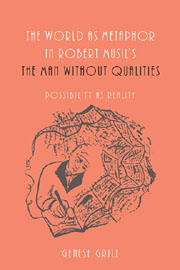3 - Word Magic
Published online by Cambridge University Press: 05 February 2013
Summary
In the Viennese Kunsthistorisches Museum, where Robert Musil surely must have wandered during his years in the Austrian capital, the Egyptian rooms are dominated by the figures of the sibling lovers Isis and Osiris, and, as one would expect, by artifacts representing the Egyptian fascination with the themes of death and resurrection. One of the many depictions of the corn god Osiris is accompanied by a tiny hunting arrow in the shape of a back bone, which, the inscription reads, was, in larger size, often affixed to the backs of mummies. This amulet is, on its own, the hieroglyph for “duration.” When upright, however, the caption explains, the hieroglyph changes its meaning to “resurrection.” Duration, in other words, within the context of an agricultural mythos of death and regeneration, comes to mean resurrection. A vitrine labeled simply “Magic,” contains statuettes of enemies with bound arms, tiny male figurines with gigantic phalli, women figurines exposing their genitals, examples of metaphoric ritual magic ensuring the continuation and maintenance of the agricultural cycle. A prostrate Osiris figure is described as a “mummy resurrected to life with aroused penis.” Just around the corner we find a Death-papyrus that reads: “There are three kinds of eternity, the kind that constantly renews itself, the kind that is always changing, and the kind that constantly is,” reminding us of Musil's Isis and Osiris poem, which, he wrote, contained the novel “in nucleo” (T, 847).
- Type
- Chapter
- Information
- The World as Metaphor in Robert Musil's 'The Man without Qualities'Possibility as Reality, pp. 93 - 118Publisher: Boydell & BrewerPrint publication year: 2012



